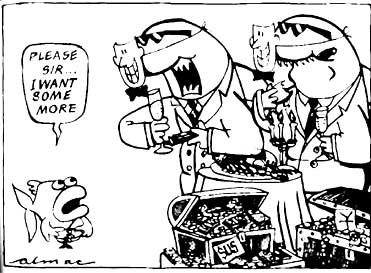Our fisheries and all New Zealander's interests are being poisoned by the failure of successive governments to address long-standing issues with the quota management system.

Billions of dollars that could have accrued to our national economy have been squandered as a consequence.
Recently the Kiwi-made movie, The Great New Zealand Fishing Scandal screened on pay television.
This documentary deserves wider coverage because it exposes dark secrets that have been lurking over the horizon for years.
New Zealanders are rightly concerned that foreign fleets are fishing in our regional waters unconstrained by standards, many without official observers on board and killing untold numbers of dolphin every year.
Meanwhile, local commercial fishermen cannot access enough quota to continue fishing because foreign vessels are utilising the available quota. How can this be?
Privatisation of NZ fisheries
In 1986 New Zealand pioneered an untested regime to privatise our fisheries and introduce the quota management system (QMS). The QMS sought to encourage economic efficiency while limiting total catches.
A form of private property rights was manufactured and given away as Individual Transferable Quota (ITQ). These harvesting rights entitled the owner to catch future tonnes of fish. ITQ was freely issued on the basis of catch history, which ironically meant those who had done the greatest damage were rewarded with the most quota.
This quota could be bought and sold and various corporate interests feasted on this new wealth-generating opportunity.
One particular quirk has served to undermine the system – the ability to “lease” the harvesting right. So one did not need to catch fish to be attracted to owning quota. It could be leased out as if it were a rental house.
Resource rentals
Privatisation has also affected our national economy. Initially, Resource Rentals were charged by the government in recognition that a public resource was being mined for the commercial benefit of a few. Those were soon argued away as quota holders grew stronger.
After much lobbying the government scrapped Resource Rentals. This left quota owners as the sole landlord, enjoying the right to rent out access to New Zealand’s fish resources, in perpetuity.
As predicted before the system’s introduction, most of the quota is now owned by a few corporates. Approximately 90 percent of all quota is owned by around a dozen entities, some foreigners.
Fishing has become complicated and uneconomical for locals due to the quota “landlords” acting as middlemen, extracting rents from fishermen to access our wild fish.
Small owner/operators who used to live in the same communities they provided for have mostly gone. These were the mum and dad operations, often generational fishers, who used to husband our fisheries and care for the environment that sustained them.
Remaining fishers are dependent on the willingness of quota owners to lease them Annual Catch Entitlement, or ACE as it is known today.
Kiwis in the documentary were complaining about the refusal of these quota holders to spread the ACE around, but the QMS allows almost complete freedom for a quota owner to choose who will catch the fish.
Quota owners are obliged to maximise returns for their shareholders. They can earn higher rentals from their joint venture charters who hire cheap foreign labour. This avoids the need to employ Kiwis and pay compliance costs.
Exposing the quota system
The refusal of Kiwi fishermen to speak out against the quota management system arises either from ignorance or fear of falling foul of the companies that dish out the catching rights.
Ultimately, the quota management system is delivering exactly what it was designed to achieve – greatest economic efficiency.
An observer could be excused thinking the quota system is a religion that nobody feels empowered to challenge in fear of disclosing some dark, heretic beliefs.
It is in the public interest that the quota system is exposed because it incentivises an industry to draw on corrupt practices perfected by the tobacco industry years ago, and it is unethical.
Such influence extends to the industry gaining additional control of management processes and expecting their own research papers to be accepted. It also is evidenced by their insistence that dubious statistical models are “science” and should be accepted as the best information for decision-making, even though these models selectively ignore important data while incorporating masses of assumptions.
Fisheries managers seem to have fallen into the trap of acting in terrorem, a legal phrase used recently in the Supreme Court, which means to scare a person into complying with the terms of an agreement.
The legacy of privatisation, being compliant to industry demands and not maintaining high environmental standards has been at the expense of every New Zealander’s social, economic and cultural wellbeing.
Refocusing fisheries management on the statutory obligation of the Minister to have particular regard to kaitiakitanga, the Maori concept of stewardship of our resources, with special consideration for the people who follow us, would resolve most of the issues highlighted in the documentary.
To achieve maximum benefit from our fisheries we must insist that foreigners are banished, leaving New Zealand fish for Kiwi fishermen.
We must also empower our government and fisheries managers to reform the current system that encourages the rent-seeking behaviour of quota owners.
The responsibility to protect the environmental and fishing interests of today’s citizens and tomorrow’s child rests with us all. |





